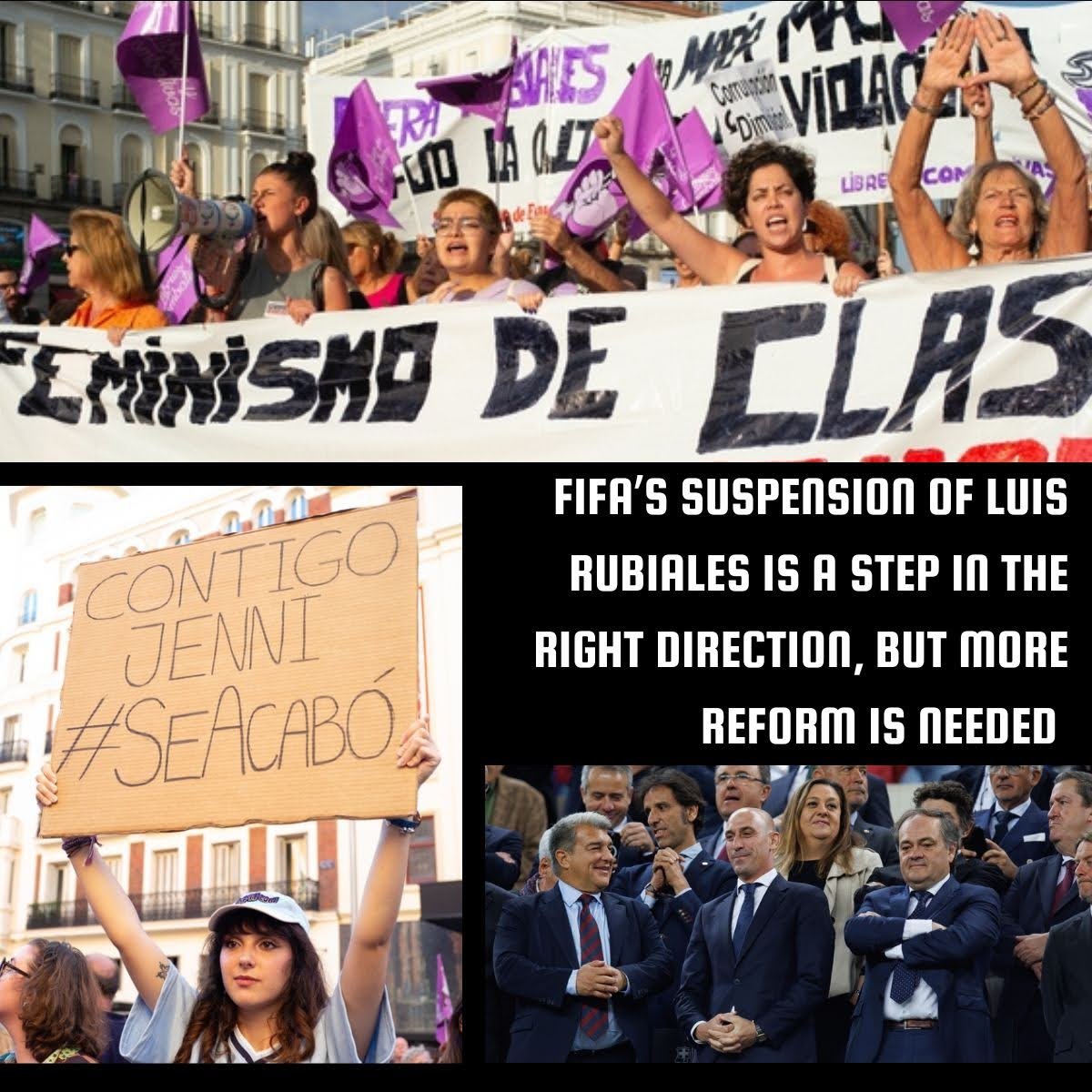On Monday, October 30, FIFA announced a three-year suspension of Luis Rubiales, the former president of the Royal Spanish Football Federation (in Spanish, the Real Federación Española de Fútbol, or “RFEF”), for kissing a player during the medal ceremony at the Women’s World Cup this summer. The suspension is surprising given FIFA’s questionable record on gender equality, but fails to adequately condemn systemic issues within the Spanish federation.
Rubiales’ conduct at the medal ceremony followed repeated protests by Spain’s national team players about the team’s coaching staff. In 2022, fifteen members of the national team sent letters to the RFEF stating they would not play for the national team until changes were made in the federation. In response, the RFEF announced its support for the team’s head coach, Jorge Vilda, and required the players who sent letters to apologize in order to be considered for the World Cup roster. In total, eight players apologized, and three were selected for the World Cup. Vilda refused to resign and managed the team throughout the tournament in Australia and New Zealand.
Despite the turbulence preceding the tournament, the Spanish team pulled off a World Cup victory over England in the championship in one of the most competitive years in women’s soccer history. Unfortunately, the team’s impressive performance was overshadowed when Rubiales forcibly kissed Jennifer Hermoso, Spain’s all-time leading goal scorer, on live television. Though the RFEF insisted the kiss was consensual, Hermoso issued a statement vehemently disagreeing, calling the incident “an impulse-driven, sexist, out-of-place act without any consent on my part,” and accusing the RFEF of pressuring her to say otherwise. She subsequently pressed criminal charges for sexual assault.
The brazen assault sparked unprecedented protest about sexism and gender inequity in women’s sports, with officials at all levels of international soccer condemning Rubiales’ behavior, from Spain’s professional league “La Liga” to UEFA, the preeminent European soccer league. Internally, more than eighty Spanish players signed a letter to the RFEF announcing a boycott of national team duties until changes were made in the federation, and the entire coaching staff, with the exception of head coach Jorge Vilda, resigned in protest. FIFA opened disciplinary proceedings against Rubiales just days after the incident, and quickly issued a 90-day provisional suspension.
In spite of the backlash, the RFEF continued to defend Rubiales, though Vilda was fired. Presumably in retaliation, the federation called up the striking players for the team’s post-World Cup matches, with the threat of severe sanctions looming for players that failed to report. Notably, Hermoso was left off of that roster, a decision the RFEF said was made to “protect her.” The RFEF also threatened to take legal action against the players who signed a letter of support for Hermoso.
On September 10, Rubiales resigned from his position. The players have ended their boycott following lengthy negotiations with the RFEF resulting in an agreement that promises a commitment to gender equity.
This Monday, the FIFA Disciplinary Committee banned Rubiales from “all football-related activities” for three years for violating article 13 of the FIFA Disciplinary Code (the Code). That provision generally prohibits indecent conduct, but notably does not include specific prohibitions on sexual assault or harassment. Article 15 of the Code prohibits gender discrimination, but FIFA curiously did not pursue a charge under that provision. The suspension came as a surprise to many, as FIFA has not been particularly progressive on issues of gender equity.
Though the suspension is a moderate victory for Hermoso and the Spanish women, FIFA appears content to let Rubiales take the fall for the RFEF’s dismal treatment of its women’s team. Rubiales’ brazen conduct was the consequence of an unchecked misogynistic culture in the RFEF that has persisted despite player protest. FIFA has notably failed to comment on the RFEF’s retaliation against its national team players, nor does the FIFA Disciplinary Code prevent retaliation or offer any protection for players who speak out against mistreatment. International governing bodies should set the minimum standards of player safety, yet, until now, FIFA has idly stood by while the Spanish players sacrificed their careers to effect change. Hopefully, the Rubiales suspension is just the first domino to fall in FIFA’s path towards stronger protections for female athletes.
Stay tuned tohttps://twitter.com/HBCSportsLaw orhttps://www.linkedin.com/company/hutchinson-black-and-cook-llc/ for the latest in Sports Law news and opinions.
